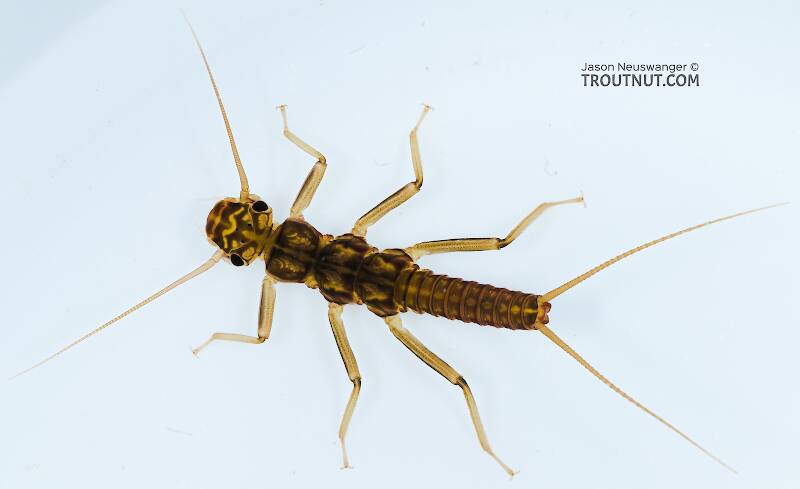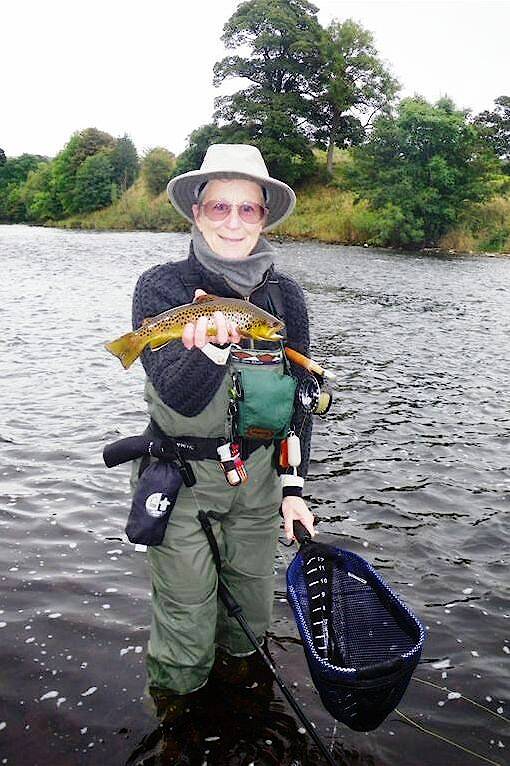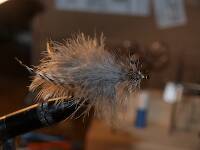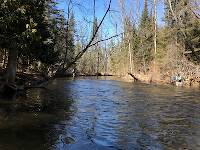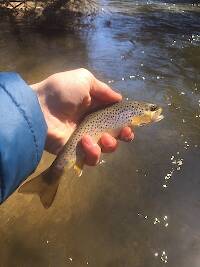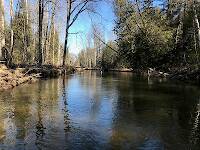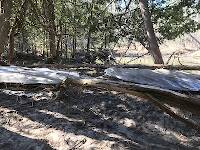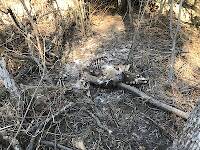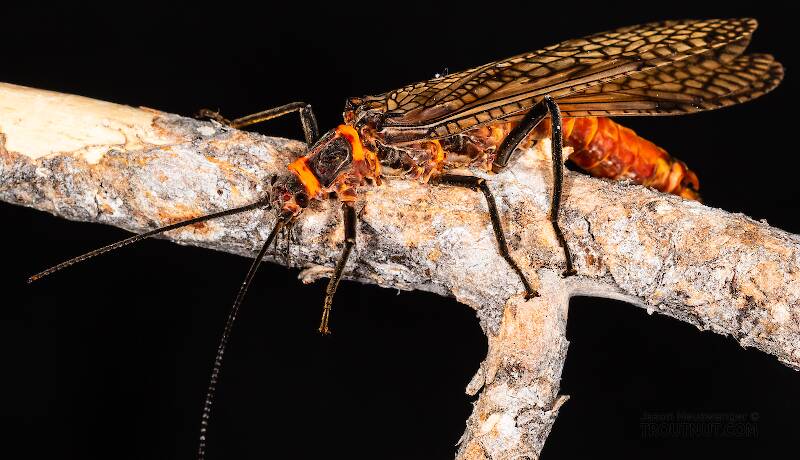
Salmonflies
Pteronarcys californica
The giant Salmonflies of the Western mountains are legendary for their proclivity to elicit consistent dry-fly action and ferocious strikes.
Featured on the forum

Troutnut is a project started in 2003 by salmonid ecologist Jason "Troutnut" Neuswanger to help anglers and
fly tyers unabashedly embrace the entomological side of the sport. Learn more about Troutnut or
support the project for an enhanced experience here.
Trtklr on Sep 16, 2008September 16th, 2008, 5:12 am EDT
all the discussion about patterns on this site make me type up this article I read in SPORTS AFIELD BY JASON LUCAS 1957. every time I read fly discussion patterns here I grin and think about this article.
-----------------------------------------------------------------------
lets take an imaginary chap who's called herbert smith. herb has been flyfishing for trout for a years with fair success, but he isn't up in the expert class and admits it. back in one corner are a dozen of the country's leading fly anglers in a very solemn discussion. some sort of expert anglers convention got them together.
here, says herb to himself, is my chance to get the real lowdown on the fine points of this fly-fishing business. he strolls up pretending not to notice them, sits down behind an open newspaper, and strains his ears to catch their words of piscatorial wisdom. what does he hear?
nothing but fly patterns. they're showing each other their fly boxes, and each seems able to name thousands of patterns off hand. herb gathers from their casual remarks that, of course, they all tie their own flies. they wouldn't consider themselves real trout fishermen if they didn't. despair comes over herb. it would take him 20 years of study to learn fly patterns as well as thet know them, and he hasn't time or fishing opportunities enough for that. so the only question seems to be whether he should give up the sport or be satisfied to remain a dub all his life. he gets up his courage and speaks to the mighty anglers.
"gentlemen, pardon me for interupting, but do I have to know fly patterns as well as you to have any real success catching trout?"
they turn and stare at him in consternation. and suddenly they break out in a roar of laughter.
"heck", says the noted henry x pert, "you don't have to know anything about patterns to be as good a trout-fly fisherman as anybody else. you'll probably catch more trout if you don't know them, because instead of wasting a lot of time changing flies you'll keep your fly out where a trout can take it"
herb puts a hand to his brow. "but your deep discussion of patterns . . .?"
"oh, that. it's only a little game fly fishermen have to amuse themselves. you know, like arguing which came first, the chicken or the egg. doesn't mean a thing".
herb gulps. "well, anyhow, don't I have to learn to tie my own flies?"
they all chuckle, and the famous ira walton III answers "tying flies is a nice hobby-for anybody that likes to tie flies. but it won't help you catch one more trout any more than making your own lures would help you catch more bass"
this after their ponderous debate about patterns, is getting herb pretty dizzy, but after a moments thought he comes up with another question.
how many patterns does one really need to be successful in trout fishing?
ah, now he's stirred up an argument. most of them agree on six. that seems, for some reason, to be the favorite maximum number of patterns thought necessary;almost no leading angler or angling writer holds that one needs seven or more. but no two of them agree on what those six should be, and that's what the argument is about. finally ira walton turns to herb and says the fact that they dont agree proves that it doesn't make much difference what they are-just get six that are pretty different from on each other.
the rest nod reluctant agreement. henry x pert hadn't joined the last argument he just stood there grinning
who, he inquires, is the greatest investigator of trout fly matters this country has ever produced?
no disagreement there of course, its the late edward ringwood hewitt. he wrote some profound books on the subject, but since he didn't write for magazines it seems that only top notch anglers are familiar with his work. he was born the year after lincoln died and caught fish eaten by wilhelm I of germany, and bismark, which would make would make him seem a historical character-but in an account of an interview with him in march of 1956 issue of sports afield, he was still very active mentally and physically in spite of having recently broken a leg while fishing. he was right up to the minute, able to show far younger anglers where they were going wrong in their latest fishing theories.
how many dry fly patterns, henry asks, does hewitt say one needs to catch all possible trout?
one, ira admits reluctantly. he mentions a medium brown, but implies that it doesn't matter much what the color is.
and what natural fly should it imitate?
why, its the bivisible he invented, which isnt supposed to represent anything but some hackles tied around a hook. some one solid color the trout can see, but always with white in front so the user can see it easily too. bivisible, equally visible to man and fish.
poor herb mops his brow. all he'd ever heard or read regarding trout flies seemed to be tumbling about his ears.
do you mean to say, he asks, that just a little tuft of hackles, representing nothing, will get as many trout as all my nice patterns?
hush! warned ira hastily, glancing around. we don't want that to leak out any more than we can help. it takes about 30 years of constant fishing for anbody to find it out for himself. why, if it got to be common knolwedge it would ruin the sport, make it unpopular. when somebody failed to catch trout he couldn't blame it on not having the right fly-he'd have to admit that it was because he didn't fish right. that would be awful!
herbs head sank until it was what one might call hanging, no longer could he meet their eyes or get a word out. so he couldn't blame his catching none that day, while tom got plenty fine ones, on toms having the right pattern while he didn't. he'd have to admit that tom was the better fisherman.
pardon me gentlemen, he muttered and staggered off to the bar for a double scotch. so we'll have to continue this discussion without herb, and hope he doesnt get too tight.
if he'd gone on with it. they'd all have told him-and so would edward ringwood hewitt if he'd been there-that while the value of patterns is at least highly questionable, every last trout angler of any experience would agree that a matter of extreme importance indeed, at most times is the size of the fly.
then, you may ask, how about the times when you yourself were catching nothing until you changed patterns, and suddenly began to catch lots? might have been that they suddenly started rising then. but its more likely that it was the size of the fly that did the trick.
you may think you have me there, since sometimes both the fly that works and the one that doesn't are say , size 12. trouble is that you're talking about fly sizes. On a size 12 hook you may have either a skimpy little nymph consisting of a few strands of something twisted on tight, or a great, big spider. at a given time, either may be just exactly wht the trout want, and the other just exactly what they don't want.
so i think few really experienced anglers will disagree with me when i say for catching trout, its far better to have flies all on color, but various overall sizes(which will mean some different hook sizes too), than to have 1000 patterns all the same size.
but, provided the fly is roughly the right size for the time, by far the most important thing of all is to learn how to fish for trout with flies. that is, where to find trout and how to present the fly.
this, too, isn't nea4ly as complicated as some try to make it seem. its chiefly a matter of studying feeding havits just a little, knowing where to look for them and using your head. the way not to catch trout is to rely on switching patterns instead of learning how to fish.
how many patterns do i personally think useful? three-one mainly black, one mainly white, and one of some nuetral shade in between;it makes no difference what they're called. do I myself stick to those three colors? goodness no! that would be no fun at all. but i really think i catch almost as many trout on them as I would if i stuck to those three colors, or to hewitts one color;that is, if you'll count only when i'm fishing, giving me time out for all my fly-changing.
after all, i get a lot of fun from monkeying around with all those patterns, and that's what I'm out for-fun. if i just wanted dead trout i could buy them frozen.
-----------------------------------------------------------------------
-----------------------------------------------------------------------
lets take an imaginary chap who's called herbert smith. herb has been flyfishing for trout for a years with fair success, but he isn't up in the expert class and admits it. back in one corner are a dozen of the country's leading fly anglers in a very solemn discussion. some sort of expert anglers convention got them together.
here, says herb to himself, is my chance to get the real lowdown on the fine points of this fly-fishing business. he strolls up pretending not to notice them, sits down behind an open newspaper, and strains his ears to catch their words of piscatorial wisdom. what does he hear?
nothing but fly patterns. they're showing each other their fly boxes, and each seems able to name thousands of patterns off hand. herb gathers from their casual remarks that, of course, they all tie their own flies. they wouldn't consider themselves real trout fishermen if they didn't. despair comes over herb. it would take him 20 years of study to learn fly patterns as well as thet know them, and he hasn't time or fishing opportunities enough for that. so the only question seems to be whether he should give up the sport or be satisfied to remain a dub all his life. he gets up his courage and speaks to the mighty anglers.
"gentlemen, pardon me for interupting, but do I have to know fly patterns as well as you to have any real success catching trout?"
they turn and stare at him in consternation. and suddenly they break out in a roar of laughter.
"heck", says the noted henry x pert, "you don't have to know anything about patterns to be as good a trout-fly fisherman as anybody else. you'll probably catch more trout if you don't know them, because instead of wasting a lot of time changing flies you'll keep your fly out where a trout can take it"
herb puts a hand to his brow. "but your deep discussion of patterns . . .?"
"oh, that. it's only a little game fly fishermen have to amuse themselves. you know, like arguing which came first, the chicken or the egg. doesn't mean a thing".
herb gulps. "well, anyhow, don't I have to learn to tie my own flies?"
they all chuckle, and the famous ira walton III answers "tying flies is a nice hobby-for anybody that likes to tie flies. but it won't help you catch one more trout any more than making your own lures would help you catch more bass"
this after their ponderous debate about patterns, is getting herb pretty dizzy, but after a moments thought he comes up with another question.
how many patterns does one really need to be successful in trout fishing?
ah, now he's stirred up an argument. most of them agree on six. that seems, for some reason, to be the favorite maximum number of patterns thought necessary;almost no leading angler or angling writer holds that one needs seven or more. but no two of them agree on what those six should be, and that's what the argument is about. finally ira walton turns to herb and says the fact that they dont agree proves that it doesn't make much difference what they are-just get six that are pretty different from on each other.
the rest nod reluctant agreement. henry x pert hadn't joined the last argument he just stood there grinning
who, he inquires, is the greatest investigator of trout fly matters this country has ever produced?
no disagreement there of course, its the late edward ringwood hewitt. he wrote some profound books on the subject, but since he didn't write for magazines it seems that only top notch anglers are familiar with his work. he was born the year after lincoln died and caught fish eaten by wilhelm I of germany, and bismark, which would make would make him seem a historical character-but in an account of an interview with him in march of 1956 issue of sports afield, he was still very active mentally and physically in spite of having recently broken a leg while fishing. he was right up to the minute, able to show far younger anglers where they were going wrong in their latest fishing theories.
how many dry fly patterns, henry asks, does hewitt say one needs to catch all possible trout?
one, ira admits reluctantly. he mentions a medium brown, but implies that it doesn't matter much what the color is.
and what natural fly should it imitate?
why, its the bivisible he invented, which isnt supposed to represent anything but some hackles tied around a hook. some one solid color the trout can see, but always with white in front so the user can see it easily too. bivisible, equally visible to man and fish.
poor herb mops his brow. all he'd ever heard or read regarding trout flies seemed to be tumbling about his ears.
do you mean to say, he asks, that just a little tuft of hackles, representing nothing, will get as many trout as all my nice patterns?
hush! warned ira hastily, glancing around. we don't want that to leak out any more than we can help. it takes about 30 years of constant fishing for anbody to find it out for himself. why, if it got to be common knolwedge it would ruin the sport, make it unpopular. when somebody failed to catch trout he couldn't blame it on not having the right fly-he'd have to admit that it was because he didn't fish right. that would be awful!
herbs head sank until it was what one might call hanging, no longer could he meet their eyes or get a word out. so he couldn't blame his catching none that day, while tom got plenty fine ones, on toms having the right pattern while he didn't. he'd have to admit that tom was the better fisherman.
pardon me gentlemen, he muttered and staggered off to the bar for a double scotch. so we'll have to continue this discussion without herb, and hope he doesnt get too tight.
if he'd gone on with it. they'd all have told him-and so would edward ringwood hewitt if he'd been there-that while the value of patterns is at least highly questionable, every last trout angler of any experience would agree that a matter of extreme importance indeed, at most times is the size of the fly.
then, you may ask, how about the times when you yourself were catching nothing until you changed patterns, and suddenly began to catch lots? might have been that they suddenly started rising then. but its more likely that it was the size of the fly that did the trick.
you may think you have me there, since sometimes both the fly that works and the one that doesn't are say , size 12. trouble is that you're talking about fly sizes. On a size 12 hook you may have either a skimpy little nymph consisting of a few strands of something twisted on tight, or a great, big spider. at a given time, either may be just exactly wht the trout want, and the other just exactly what they don't want.
so i think few really experienced anglers will disagree with me when i say for catching trout, its far better to have flies all on color, but various overall sizes(which will mean some different hook sizes too), than to have 1000 patterns all the same size.
but, provided the fly is roughly the right size for the time, by far the most important thing of all is to learn how to fish for trout with flies. that is, where to find trout and how to present the fly.
this, too, isn't nea4ly as complicated as some try to make it seem. its chiefly a matter of studying feeding havits just a little, knowing where to look for them and using your head. the way not to catch trout is to rely on switching patterns instead of learning how to fish.
how many patterns do i personally think useful? three-one mainly black, one mainly white, and one of some nuetral shade in between;it makes no difference what they're called. do I myself stick to those three colors? goodness no! that would be no fun at all. but i really think i catch almost as many trout on them as I would if i stuck to those three colors, or to hewitts one color;that is, if you'll count only when i'm fishing, giving me time out for all my fly-changing.
after all, i get a lot of fun from monkeying around with all those patterns, and that's what I'm out for-fun. if i just wanted dead trout i could buy them frozen.
-----------------------------------------------------------------------
I have seen nothing more beautiful than the sunrise on a cold stream.
CaseyP on Sep 16, 2008September 16th, 2008, 6:14 am EDT
magnificent! you have done us all a great service by typing all that up so we could read it. it certainly validates what some of us have come to suspect.
"You can observe a lot by watching." Yogi Berra
RleeP on Sep 16, 2008September 16th, 2008, 8:56 am EDT
That was great and it took me back. I'll I need is a big bowl of raisin bran and I'm back at the kitchen table and 7 years old again reading it from the new issue of Sports Afield.
Trtklr on Apr 29, 2009April 29th, 2009, 10:41 am EDT
i'm bringing this back up for hellgramite and in response "why we make fly fishing complicated"
I have seen nothing more beautiful than the sunrise on a cold stream.
Quick Reply
Related Discussions
Topic
Replies
Last Reply
5
Jan 29, 2013
by Falsifly
by Falsifly


